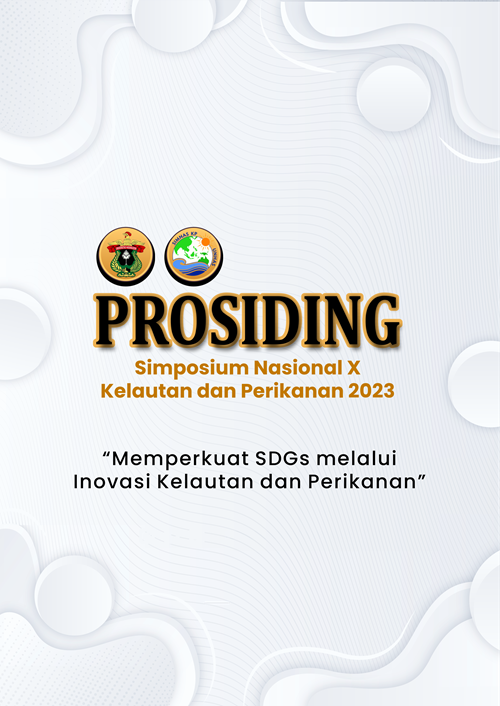Fraksinasi Logam Pb dalam Sedimen Laut Untuk Estimasi Nilai Potensial Biovaibility di Kepulauan Wilayah Perairan Provinsi Maluku Utara
Keywords:
metal pb, geochemical fractionation, sediment, BCR sequential extractionAbstract
Determination of the geochemical fractionation of metals is also important to identify sources of metal pollutants in waters, whether they originate from natural processes or originate from human activities. This study aims to analyze the potential availability of Pb metal in sediments for biota and analyze the relationship between sediment grain size and total organic matter with the geochemical characteristics of Pb metal. The research was carried out in the North Maluku Waters Region in March 2023. consisting of 4 stations namely Ternate Island (Bastiong Harbor and Waters around Pertamina Jambula), Tidore (PLTU Waters) and Halmahera (Waters around the NHM Gold Mining area). And each station consists of 3 points. Sample testing was carried out at the Chemical Oceanography Laboratory, Faculty of Maritime Affairs and Fisheries, Hasanuddin University. And metal analysis was carried out at the Agency for Standardization and Industrial Services Policy Testing Laboratory BBSP JIHPMM Makassar City. Metal concentrations in the sediment fraction were determined by the BCR Sequential Extraction method (Based on Sarkar et al., (2014) The results showed that the total fraction was unstable at station 1, 2 and 3 were higher than the non-labile fraction, while at station 4 it was found that the total non-labile fraction was higher than the labile fraction.Downloads
References
Gao XL, Li PM. 2012. Concentration and fractionation of trace metals in surface sediments of intertidal Bohai Bay, China. Mar Pollut Bull 64, 1529–1536.
Hutabarat, S., and S.M. Evans. 2012. Introduction to Oceanography. University of Indonesia Publisher-Press. Jakarta.
Liu Z, Pan S, Sun Z, Ma R, Chen L, Wang Y, Wang S. 2015. Heavy metal spatial variability and historical changes in the Yangtze River estuary and North Jiangsu tidal flat. Mar Pollut Bull 98, 115–129.
Masluka, L. 2013. The relationship between the concentrations of heavy metals Pb, Cd, Cu and Zn with organic matter and grain size in sediments in the flood estuary of the West Canal, Semarang. Marina Oceanographic Bulletin, Vol 2. Pp 65-62.
Najamuddin, 2017. Dynamics of heavy metals Pb and Zn in the Jeneberang Estuary Waters, Makassar. Dissertation of the Postgraduate School of the Bogor Agricultural Institute.
Nugroho, S.H., and A. Basit. 2014. Sediment distribution based on grain size analysis in Weda Bay, North Maluku. Journal of Tropical Marine Science and Technology. Vol. 6(1). pp. 229-240.
Peng, W., Li, X., Xiao, S., & Fan, W. (2018). Review of remediation technologies for sediments contaminated by heavy metals. Journal of Soils and Sediments.18(4), 1701–1719.https://doi.org/10.1007/s11368-018-1921-7
Puspasari, D.A., I.E. Suprihatin., and I.G. A. Kunti Sri Panca Dewi. 2014. Speciation and bioavailability of Cu and Zn metals in the waters and sediments of the Badung River Estuary in the Ngurah Rai Forest Park route Denpasar Bali, Journal of Chemistry. Vol. 8(2),pp. 153-158.
Riba, I., E. Garcia –Luque, J. Blasco, and D. Valls, TA. 2003 Biovaibility of Heavy Metals Bound To Estuarine Sediments as a Function of pH and Salinity Values. Chem Spec Biovai, 15:101-114. https://doi.org/10.3184/095422903782775163.
Samawi, M.F. 2007. Design of City Beach water pollution control systems (Water Case Study: Makassar City Beach). Graduate School Dissertation, Bogor Agricultural University.
Sarkar, S. K., P.J.C. Favas., D. Rakhsit., and K.K Satpathy. 2014. Geochemical Speciation and Risk Assesment of Heavy Metals in Soils and Sediments, Enviromental Risk Assesment of Soil Contamination. Chapter 25.
Selviana, D. 2016. Fractionation of the heavy metal copper (Cu) in marine sediments as a means of estimating the potential value of bioavailability in Jakarta Bay waters. Marine Science Study Program Thesis. Faculty of Fisheries and Marine Science.
Tessier A, Campbell PGC, Bisson M. 1979. Sequential extraction procedure for the speciation of particulate trace metals. Anal Chem 51: 844-851.
Teixeira EC, Rodrigues MLK, Alves MFC, Barbosa JR. 2003. Study of geochemical distribution of heavy metals in sediments in areas impacted by coal mining. In: Locat J, Galvez-Cloutier R, Chaney RC, Demars K. (eds.). Contaminated sediments: Characterization, Evaluation, Mitigation/Restoration, and Management Strategy Performance. West Conshohocken (US): ASTM International. 72–86pp.
Turekian KK. 2010. Marine Chemistry and Geochemistry. San Diego (US): Academic Press.
Werorilangi, S, 2012. Metal speciation bioavailability for benthic biota and spatial distribution patterns in coastal sediments in Makassar City. Dissertation. Agricultural Science Study Program. Hasanuddin University Postgraduate Program, Makassar.
Werorilangi, S. A. Tahir, A. Noor, and M.F. Samawi, 2013. Pollution status and metal bioavailability potential in coastal sediments of Makassar City. Proceedings of the X Annual National Seminar on Fisheries and Marine Products UGM. Yogyakarta.
Werorilangi, S., A. Noor., M.F. Samawi, and F. Ahmad, 2019. Spatial distribution of Pb, Cd, Cu, Zn metals and geochemical fractions in the coastal waters of Makassar City. Spermonde Journal of Marine Science.
Yap, C.K., A. Ismail., dan S.G. Tan. 2003. Concentration, Distribution and Gheochemical Speciation of Copper. In Surface Sedimen of Straits of Malacca. Pakistan Jornalof Biological Sciences. Vol 6(12), pp. 1021-1026.
Yang, ZT., L.S. Chan., dan Q.S. Liu. 2007. Magnetic Signature of Heavy Metals Pollution of Sediments; Case Study From The East Lakein Wuhan, China. Environment Geol. Vol. 52, pp 1639-1650.
Yolanda, S., Rosmaidar, Nazaruddin, Armansyah, T., Balqis, U., and Fahrima, Y. (2017). Effect of Lead (Pb) exposure on Histopathology of Tilapia (Oreochromis niloticus) Gills. Veterinary Student Scientific Journal, 1(4), 736-741.



